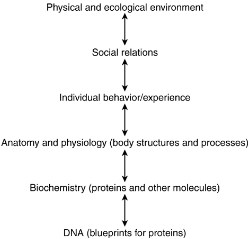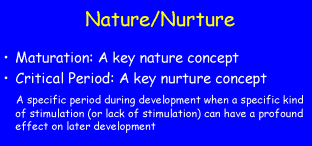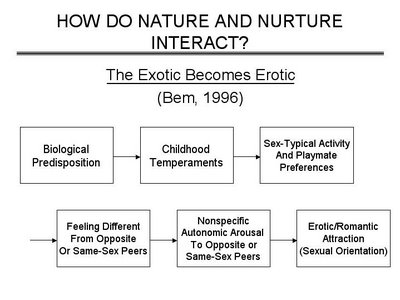PARENTS WHO FAIL TO RESPOND TO THEIR CHILD'S BAD BEHAVIOR
EDITORIAL: A SECOND LOOK AT NATURE AND NURTURE
Excerpts of Study
One of the most complex features of the brain is its control of behavior, and research in this area is demonstrating that many of our long-held ideas about behavior are incorrect.
Not many decades ago, even scientists thought the newborn brain was a "blank slate," and that all behavior, good and bad, was learned. Research now shows conclusively that this idea was wrong.
Today researchers estimate that around fifty percent of behavior is genetically acquired, and thus attributable to "nature." Even a trait such as poor logic, which can lead to bad behavior, may be transmitted genetically, possibly by preventing the brain's neurons from connecting normally.

It is equally remarkable that it has taken us so long to understand that when a malfunctioning brain is inherited, bad behavior can be the result.
These billions, however, are failing to help. Why? Judith Rich Harris in her book, The Nature Assumption, presents a strong argument that neither home conditions nor parenting have any effect on the development of a child's personality and behavior...For example, researchers often attributed children's behavior problems to parental discipline styles, failing to note that those disciplinary styles frequently evolved in response to children's aberrant behavior. Indeed, Harris cites evidence showing that peers have a greater influence on a child's behavior than parents do.
It is critical that we recognize the crucial role that genes, often coupled with biological insults, play in determining behavior. Parents, including parents of adopted children, need to realize that if their children have "gone bad," it may be the result of an innate genetic vulnerability or physical insult rather than psychological trauma.










1 comment:
Many of those failed banks were "marine banks", they denounced the New York City residency under the charter auspice of the United Nations trade commissions. All these banks' business address were just a PO Box number in the United Nations Post Office. The following is the link to where they are:
http://www.un.org/documents/ga/res/46/a46r213.htm
A/RES/46/213
79th plenary meeting
20 December 1991
United Nations/International Maritime Organization Conference of
Plenipotentiaries on a Draft Convention on
Maritime Liens and Mortgages
The General Assembly,
Recognizing the importance of the subject of maritime liens and mortgages in
ship financing and in the development of national merchant fleets,
Emphasizing the need for international uniformity and for the establishment
of a widely acceptable international legal instrument governing the subject of
maritime liens and mortgages,
Recognizing the desirability of facilitating the harmonious and orderly
development of world trade,
1. Expresses its appreciation to the United Nations Conference on Trade and
Development and to the International Maritime Organization for the valuable
work done in preparing a draft convention on maritime liens and mortgages;
2. Decides that a United Nations/International Maritime Organization
Conference of Plenipotentiaries on a Draft Convention on Maritime Liens and
Mortgages shall be convened at Geneva during the first half of 1993 for a
period of three weeks to consider the draft convention and to embody the
results of its work in a convention on maritime liens and mortgages;
Post a Comment